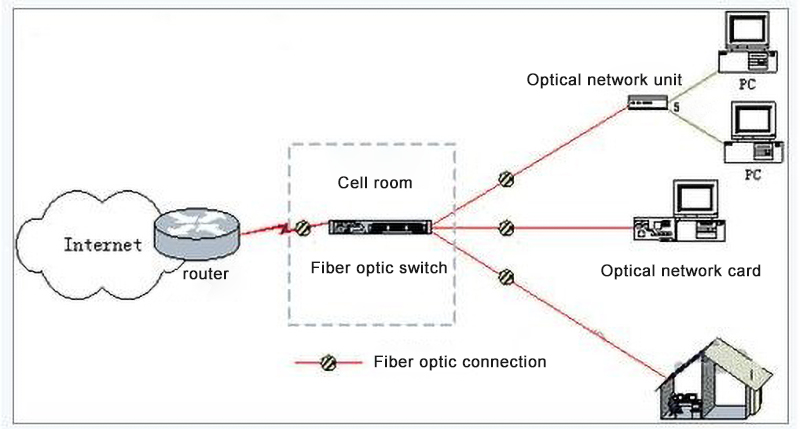Fiber-optic Ethernet technology is the convergence and development of two major mainstream communication technologies, namely Ethernet and optical networks.It concentrates on the advantages of Ethernet and optical networks, such as common Ethernet applications, low price, flexible networking, simple management, high reliability and large capacity of optical networks.
The high speed and large capacity of optical Ethernet eliminates the bandwidth bottleneck existing between the LAN and the WAN, witch will become a single network structure for converging voice, data and video in the future.Fiber-optic Ethernet products can implement WAN communication services using Ethernet packet formats using Ethernet devices.Currently, fiber-optic Ethernet can achieve standard Ethernet speeds of 10Mbps, 100Mbps, and 1Gbps.
Fiber-optic Ethernet devices are based on Layer 2 LAN switches, Layer 3 LAN switches, SONET devices, and DWDM.Some companies have developed fiber-optic Ethernet switches that offer a variety of features to ensure the best possible quality of service (such as packet sorting and congestion management).This product may require the following key technologies and features: high reliability, high port density, and quality of service guarantees.Fiber-optic Ethernet is more economical and efficient than other broadband connections, but so far it has been used only in office buildings or buildings where fibre is already laidThe strategic value of this new approach to using Ethernet is not limited to cheap access. It can be used both for access networks and for local backbone networks in service provider networks.It can be used only at Layer 2 or as an effective way to implement Layer 3 services. It can support IP, IPX and other traditional protocols.In addition, because it is still a LAN in nature, it can be used to help service providers manage the interconnection between corporate LANs and corporate LANs and other networks.
Access scheme for fiber-optic Ethernet switches
As shown in the figure, the network core device is a fiber switch placed in a cell room or a building computer room. The fiber switch is connected to an Internet edge router or a collection switch at a rate of 1000 M/100 M through an optical fiber to implement a cell network access to the Internet.
The optical fiber switch is connected with the optical network unit placed in the user’s home or the built-in optical fiber Ethernet card at the duplex 100M rate through the optical fiber and point-to-point mode. The connection between the optical fiber switch and the optical network unit through the optical fiber high-speed access to the Internet is a single-fiber two-way mode.

Compared with the existing 5 – line – based LAN broadband access, this access scheme has the following prominent features:Low-cost FTTH solution; eliminating floor switches, only the cell room is an active node, reducing maintenance costs;The single switch node in the cell room can effectively improve the utilization of switch port. Ultra high bandwidth, is 100 times ADSL; Long access distance; Network remote monitoring of each port photoelectric module.With port isolation and port bandwidth control functions; Powerful Web Server network management function.This scheme is particularly suitable for ordinary residential users, office buildings, schools and hospitals, as well as traditional telecom operators and resident network operators.
Summary:
In view of the general development trend, the application of optical fiber in the access network should firstly replace the feeder cable with the feeder fiber, and then continue to the user. However, the cost is getting higher and higher, at present, the optical fiber usually only reaches the roadside distribution box, namely the business access point (SAP).
The ultimate goal of the pure optical fiber access network is to promote the optical fiber to residential users. At present, it is not realistic to bring the optical fiber home, because the price of optical fiber is still too expensive, so the use of optical fiber Ethernet access is a low-cost FTTH solution.
(Reprinted to Weibo Fiber Online)






